How to land your first copywriting job (aka, 1001 ways to skin an HR Director)
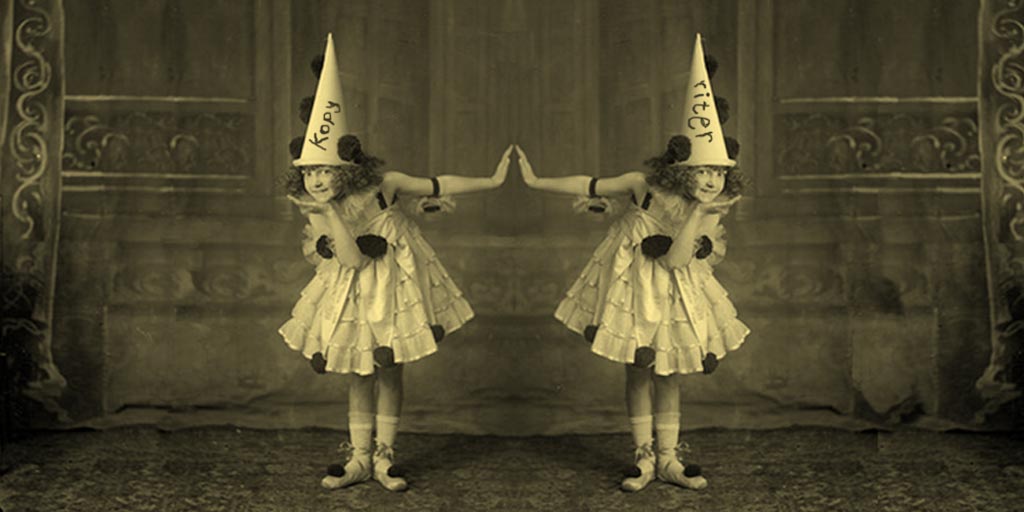
In a recent post – 37 things I’ve learned from a career in copywriting – point No.9 says, ‘There are 1001 ways of getting into this copywriting lark’.
That’s true. But if you’re new to copywriting, it won’t be long before you realise the obstacles to getting in on the game are somewhat tall, wide and spiky – and just as numerous.
They always have been and they probably always will be.
A career in copywriting sounds attractive, and everyone thinks they can write. There aren’t anywhere near as many openings as there are people wanting to get in. It’s tough.
How I landed my first copywriting job
I’d always loved playing with words (writing comics, poems, lyrics, short stories…) and admired the wit of billboard advertising. But when I first discovered there was such a thing as ‘copywriting’, I was in my third year studying Graphic Design. One of the tutors would tell his tales of the London ad scene of the 60s and 70s, and I was hooked.
I spent the next year playing creative team with other nippers on the same course, entering copywriting competitions, doing placements and lugging my portfolio around town.
I did placements at McCann Erickson (as much free vending machine coffee as you could drink) and Saatchi & Saatchi (as many free Quality Street and Fox’s Glacier Mints as you could eat).
I showed my book to Copywriters, creative teams and Creative Directors all over London – hundreds of them. Some were really kind, inspiring and helpful. Some were right up themselves. One left me waiting in reception for hours, then came down to tell me he was going into a meeting, and to “call me so we can put another date in the diary”. Thanks mate, I’d only travelled 265 miles.
My break eventually came in June 1984, when I landed a job at an agency in Covent Garden. For the first year I played the role of creative team all on my own and found that, even though I loved writing, I also had a bit of a knack for Art Direction.
In the second year, I was teamed up with a more senior Copywriter and for a while, my official writing days were over. Luckily (believe me, it didn’t feel like it at the time), I was made redundant and forced back into doing a bit of copy and a bit of art again.
And besides a few full-time stints at London ad agencies as an Art Director, I spent much of the first 18 years of my career being a ‘hybrid’ creative, well before anyone had coined the phrase. As the years passed, I started leaning more and more towards the writing side of things and I pretty much buried Jonathan the Art Director around about 2000.
That was my wiggly way into being a Copywriter, but as I’ve found out, it most definitely isn’t the only way (or the wiggliest).
Having interviewed lots of victims on Copywriters on the Rack, I’ve learned about all sorts of routes into the copywriting scene.
1) The ‘I had a plan’ way
Alice Hollis: After graduating with a degree in business and marketing back in 2006, I started a career in B2B marketing. I’ve worked both in-house as a marketing manager and agency-side as a marketing consultant…
2) The ‘whatever life throws at me’ way
Gareth Hancock: …trolley collector for Sainsbury’s, recycler pushing cardboard and polystyrene through a machine at a Samsung factory, dryliner putting plasterboards on walls on various building sites, dole, dryliner again, dole again, dryliner again, dole again…
3) The ‘word lover who gets there eventually’ way
Katherine Wildman: I studied English Literature… an unsuccessful stint selling double glazing… I joined ING Barings in the City… on the reception and switchboard… Then there was marriage, babies, ex-pat wifedom in Singapore… and a return to the UK with a divorce and a freelance start up.
4) The ‘I had a promising career, then something happened’ way
André Spiteri: Shop attendant > EFL teacher > Solicitor > Bartender > Copywriter – Not exactly the most logical career progression, but it got me where I was supposed to be in the end, so I’ll take it.
5) The ‘through the backdoor’ way
Nick Parker: …hustled my way into publishing largely because I could use Quark Xpress. Stumbled into creative agency-land largely through ignorance. Started my own thing largely because I would have regretted not trying.
6) The ‘started out as a hack’ way
Fiona Thompson: …worked as a writer and editor in fashion and textile publishing, then diverted into a business psychology consultancy. I worked as a journalist for a while, writing features for The Guardian, The Times and Esquire, then became a copywriter.
7) The ‘let’s face it, it was always going to happen’ way
Lee Trott: Went to Chelsea Art School, and got into St Martins because my sister had wowed them two years before. Ed Morris was kind enough to give me a job at Lowe in my second year… From there, Nils Leonard gave me a job at Grey, where I worked for 7 years.
8) The ‘coming out of the shadows’ way
Joe Jeffries: I worked for three years after uni as a freelance translator for sports brands… After a while, though, I wanted to be the one writing the original stuff. So I started self-studying marketing, advertising, direct-response copywriting and everything around it.
9) The ‘I was crap at everything else’ way
Nigel Graber: I started out as an abject failure, then became a dismal loser and finally a trainee pointless waster. When that didn’t work out and I also realised that being a tennis coach meant actually being good at tennis, I found a job in HR. My bosses thought I was crap at that, too, so they sent me to work in the PR department…
Let’s go a little deeper
Inspired, I ran four Twitter polls to get a broader view, and had a brilliant response (thanks to everyone who got involved).
Poll 1. Did you have some kind of formal copywriting education?
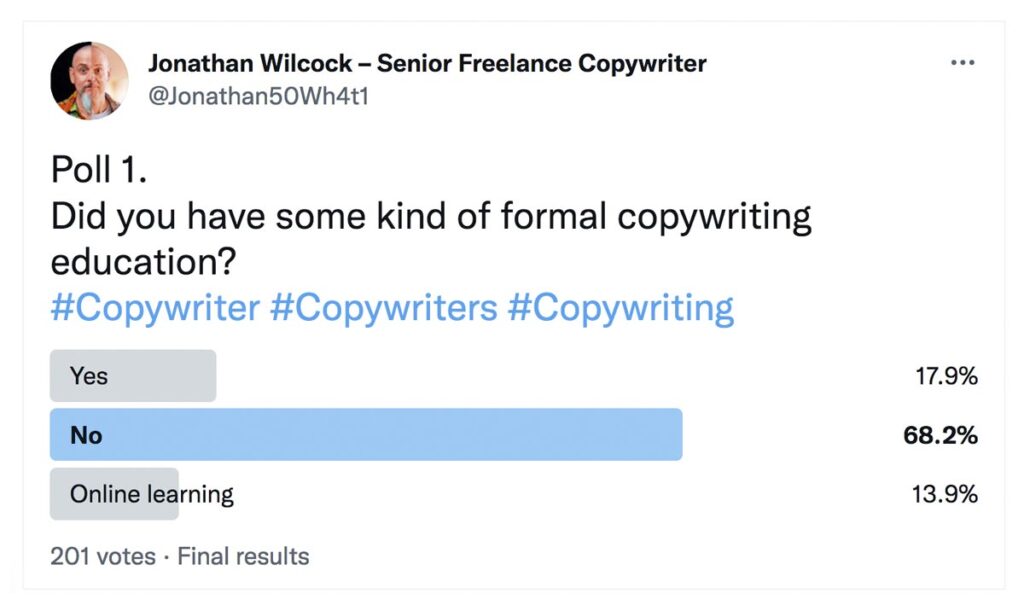
“Sort of. Journalism training.”
Siobhan O’Neill @SiobhanONeill
“I have a degree in graphic design and advertising. Early on in the course we were peared down into the two areas. And advertising was divided into art director and copywriter. I settled on the words.”
Leigh James @words_person
“Not really, no. I started as a marketing assistant aged 18 and worked my way up to (junior level) copywriter. My first form of copywriting education was a copy of @Andy_Maslen’s The Copywriting Sourcebook from my company’s old copywriter at the time “
Sarah Mullaney @shesawriterblog
“Writing, yes. Copywriting, not really. I’ve done a few courses and have a stack of books from the copywriting canon. I learn a huge amount about what works from seeing other copywriters’ work.”
Catherine Jones @cleanslatecopy
“Wrote stories on my Dad’s fag packets, did an English degree, became a film PR & wrote press releases, ran & marketed holiday cottages, case of mistaken identity led to writing as a fictional explorer, now write in many voices to earn a crust. Occasionally we can afford butter.”
Cate McKay-Haynes @CATEMH
“I started out in journalism (degree and then a job). Moved into copywriting years later and I’ve since gained a certificate in digital copywriting.”
Hayley Maguire @HayleyCMaguire
“DMA/IDM Copywriting course. (Hoping for SCA Remote next year.)”
Matt Sibley @mattsibleycopy
Poll 2. Did you do any placements or internships before landing your first copywriting work?
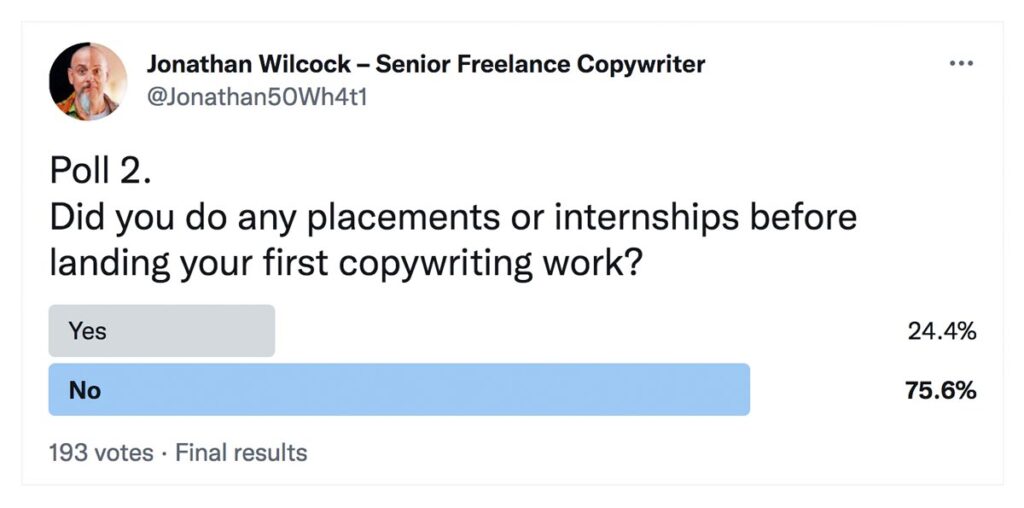
“No, but I did a lot of writing for free/cheap. Too much!
“It worked, it got me a portfolio and then an in-house role. But I should have asked for money/more money sooner!”
Penny Brazier @penthemighty
“I learned to write by learning to sell – classified small ads (property, job vacancies) for the Daily Telegraph – most people needed help with what to say. Used this to get a trainee copywriter job with an ad agency.”
Fraser Southey @FraserSouthey
“Not officially, but lots and lots of free, (or virtually free), writing.”
Claudia Jackson @Claudiajacks74
“Yes. Several.”
Bank of Creativity @BOC_ATM
I asked, “Did any lead to fulltime work?”
They replied, “Yes. Doing a number of placements meant we could see the type of place we wanted to work as well as them seeing what we could do. We created a list of top ten agencies we wanted to work at. Both had same as number 1. We got a job there as a creative team.”
“No just many years in marketing jobs where writing was a big part of it”
Denise Atkins @Deejayatkins
Poll 3. Was copywriting your first proper job?
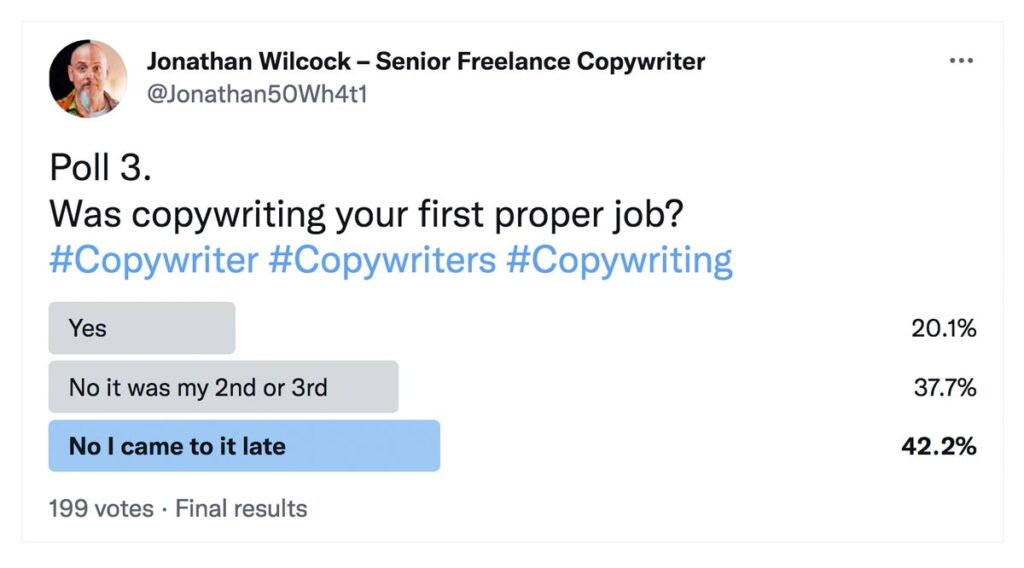
“It’s an ideal second career (or, cough, fifth) because you can apply your real-world knowledge to your work.”
Ber Leary @Ber_Leary
“I came to it fairly late, but the experience in my old industry helped me land my first decent clients.”
Sally Fox @sallymfoxwrites
“I had a grad job that was a dead end, so I went and did an MA in public relations. I had a part-time copy gig after that, then a full-time PR role before finally managing to go off and get a copywriting job.”
Mark Grainger @MarkGrainger
“First job was publishing editor of educational magazines, then from 1995 I worked on front end of websites and managed teams and content for those sites. Went freelance when children were small and stuck with it since.”
Sarah Wood @SarahWood7
“It’s my second career. Carved out my first one by accident – climbed fast in high street retail and managed a shop for a few years. Started from scratch in copywriting in 2016.”
Ruth Sedar @ruthsedarwrites
“Nope, came to it from journalism…or lack of journo commissions to make ends meet I should say.”
Rose Crompton @RoseMCrompton
Poll 4. How long did it take between leaving formal education and landing your first copywriting work?
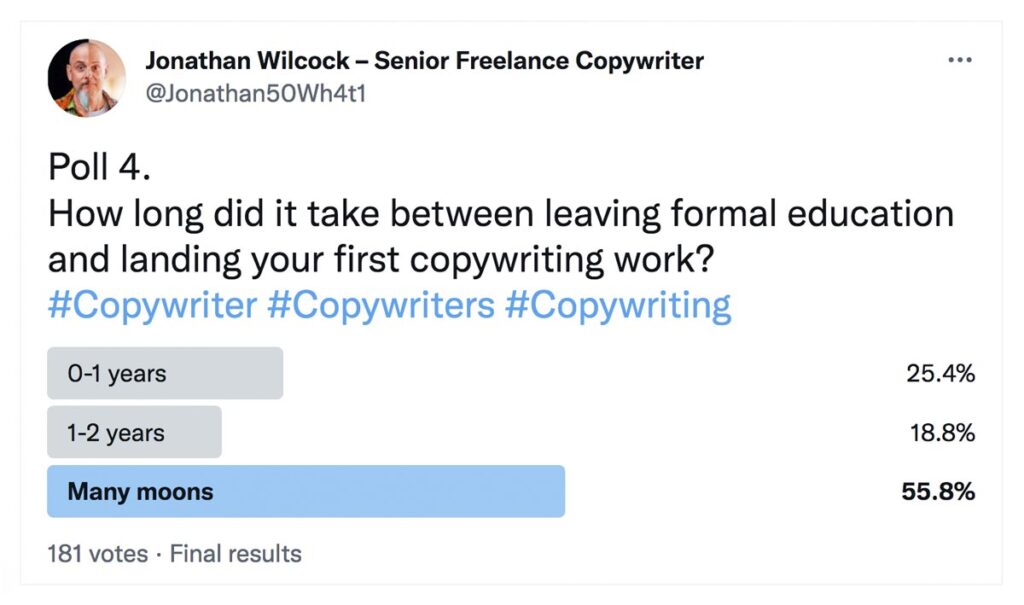
“I left school in July 1988. My first freelance copywriting invoice was sent in April 2015. You can do the maths!”
Graeme Piper @DropCapCopy
“Not even remotely! Spent 29 years as a civil servant. Then worked in project management in the charity sector for a few years. But comms work was an essential element of most of these jobs. And they all feel like preparation for what I always wanted to do: write for a living!”
Chris Guiton @WealdWordsmith
“Not a straight line. A very squiggly one.
1.Uni (Research clincian/bar job)
>Traveled/Nannied
>Teacher
>Teacher+Freelance writer
>Copywriter (mainly content)
>Copy+Editing”
Jenna St John @jenna_st_john
“I worked on a freelance basis for a while before switching to full time employment as an Editorial Consultant for a business training company (writing courses). It’s a couple of years now since I got back on the freelancing wagon.”
Stuart Davis @LincsWriter
I asked, “Enjoying being back on that wagon?”
Stuart replied, “It’s been a bit of a bumpy ride so far – happy to be on it though”
“Graduated in 2007, sent my first copywriting invoice in December 2020. Yeeshh those numbers are scary!”
Caroline King @carolineking85
“Thank you for these polls, it’s making me feel a lot better about being late to the party!”
Lucy Walbridge @Luc_Writes
So, if you’ve had no formal copywriting education, you left school decades ago and you’ve been stuck in jobs that seem to be pulling you in the wrong direction, you can still do it. Oh yes you can.
BUT, there are two things you can’t avoid.
You’ve really got to want to do it and you’re going to have to work hard.
If you’re scrabbling up the slippery copywriting slope trying to get that first break, here’s a list of things to do and get.
1) Learn from the greats. Get yourself to a decent bookshop and arm yourself with a few words of wisdom from the best in the industry. There are lots to choose from, but it would be hard to go wrong with anything by Dave Trott and ‘David Ogilvy On Advertising’ will be on everyone’s top 10 list. Ooh, and The Copy Book from D&AD is worth a special mention.
2) Trawl the Internet. There are thousands of established copywriters showing off their wares and spouting tips and insights on their blogs. Have a nosy around; see what others have to say for themselves.
3) Get on a writing course. This isn’t your golden ticket to landing a job, but it will force you to write. And if you’re fed up of writing in the first 6 months, at least you’ll know this isn’t the career for you.
4) Find a mentor. Copywriters are a lovely bunch. Many of us are happy to give advice and point you in the right direction. If you don’t ask, you won’t get, so try a direct approach. Do your research and send an email or 50. Here’s a list of potential mentors that may come up trumps for you. (I’m mentoring two newbies at the moment, so won’t be up for another until mid-late 2024).
5) Write your socks off. There are all sorts of avenues for copywriters. Blogging, web copy, social media, advertising, brand tone of voice… Whatever tickles your fancy, set yourself briefs and get writing. Find existing pieces of copy that deserve to be better and re-write them your way. Get in touch with design/PR/advertising/marketing agencies and beg them for old briefs to work on.
6) Get a portfolio together. No one is going to give you a job if you can’t prove you can write. Even if it’s not 100% polished, a portfolio of work will at least show your potential. A pdf of half a dozen of your best pieces of work is a good starting point. Something that’s neat and tidy, and small enough to attach to an email.
7) Get an online presence. At some point or other you’ll need a website, this is unavoidable. Before you go anywhere near building one, have a proper look around at how others are doing it. And if you’re not ready to commit to your own website yet, there are quite a few places you can showcase your work and post a biog, either free or not far off: Behance, Carbonmade, Creativepool and Contently are all worth a look.
8) Give your inbox a treat. There are dozens of copywriting email newsletters you could sign up to. If there were more hours in the day, I’d sign up to them all, but here are three that I particularly enjoy: Marketing Examples by Harry Dry, The Word by Dave Harland and A Self-Help Guide for Creatives by Dan Nelken.
9) Get social. A brilliant way to learn from and connect with other copywriters is through social media (if you’re not already, follow all the lovely copy-folk tagged here). Sounds obvious, but you’ll be surprised how friendly and inclusive the copywriting crowd is. Twitter (X? Really?) ain’t what it used to be, but LinkedIn seems to be getting better and better, and many swear by Facebook copywriting groups, and Instagram.
There’s no way around it; it’s going to be a slog. You’ll need thick skin, a sense of humour and a barrow-load of determination.
Copywriting isn’t easy – if it was everyone would be at it.
Even the people who seem to have had a blessed, ‘easy’ way in are grafters.
But whatever route finds you, knuckle down, have fun and good luck.
Love and patience. x
Jonathan Wilcock (that’s me) is a Senior Freelance Copywriter.
You can drop me a line here, or email jonathan@sowhatif.co.uk